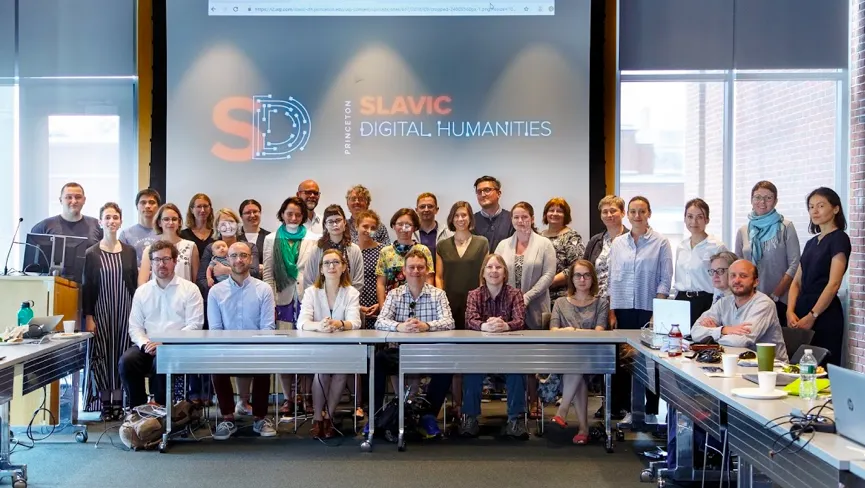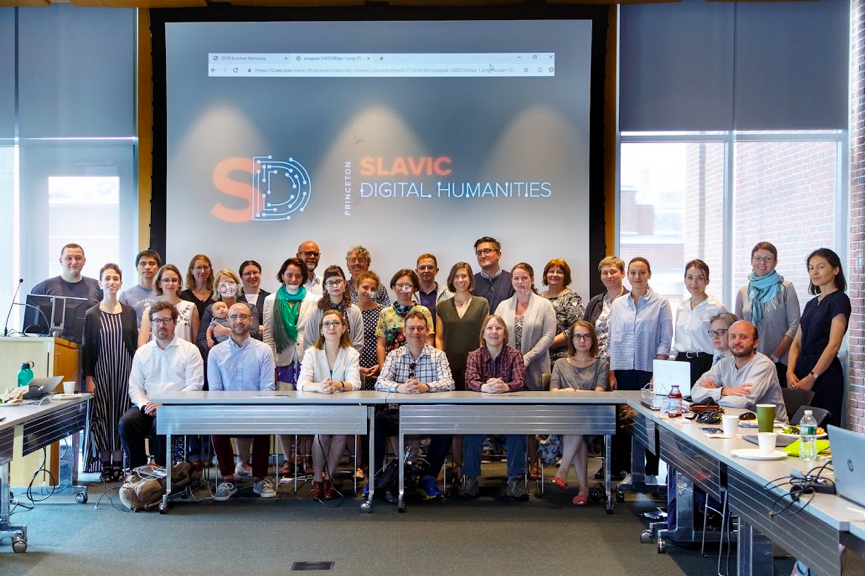CDH Becomes DARIAH’s First U.S. Cooperating Partner
31 January 2021

The Center for Digital Humanities has an exciting new designation: cooperating partner of the Digital Research Infrastructure for the Arts and Humanities (DARIAH-EU). DARIAH, formed in 2014 as as European Research Infrastructure Consortium, facilitates arts and humanities research by coordinating working groups, assembling educational materials, collaborating with research organizations, and connecting scholars across Europe and beyond.
The CDH is DARIAH’s first cooperating partner based in the United States. The other cooperating partners, which are located in Europe, include institutions like the School of Advanced Study (University of London) and Central European University. DARIAH’s nineteen members are all EU member-states or associated countries.
“It’s an honor to be the first U.S. institution invited to partner with an ongoing collaboration of European DH innovators,” said CDH Faculty Director Meredith Martin, noting “the tremendous advances that European DH scholars have made in the field.”
Toma Tasovac, director of DARIAH, described the partnership as “an important milestone for DARIAH.” He added that as a Princeton graduate alumnus, he is “delighted” to see the growth in opportunities to “meaningfully combine one’s interest in the humanities and computational methods” at the University.
The designation of cooperating partner will allow the CDH to build on what Tasovac describes as the CDH’s “expanding international reach.” Recently, the Princeton Slavic Digital Humanities Working Group, supported by the CDH, has co-hosted a DH summer program with the Herder Institute for Historical Research on East Central Europe, located in Marburg, Germany, and with other U.S. partners. The Working Group also has ongoing relationships with the DH Center at ITMO University in St. Petersburg and the HSE Centre for Digital Humanities in Moscow.

Moreover, several of the CDH’s research partnerships have important European connections. The Shakespeare and Company Project, which centers on expatriate American Sylvia Beach’s bookshop and lending library in interwar Paris, has seen press coverage in European publications like Le Temps (Switzerland) and El Pais (Spain). Derrida’s Margins illuminates the philosopher’s personal library; the vast majority of the works are in French or German.
The partnership also provides an opportunity for the CDH to expand its relationship with DARIAH itself. Currently, the CDH is collaborating with DARIAH and Library of Congress LC Labs on the New Languages for NLP: Building Linguistic Diversity in the Digital Humanities project. At the workshop series, to be hosted by the CDH beginning in summer 2021, participants will develop linguistic data and text analysis tools in less resourced languages.
The project, co-led by CDH Associate Director Natalia Ermolaev and Andrew Janco (Digital Scholarship Librarian, Haverford College) recently received a grant from the National Endowment for the Humanities Office of Digital Humanities.
Ermolaev explained that the workshop series “demonstrates core values shared by the CDH and DARIAH. We see all too well—in both the North American and European contexts—the real risks to research and culture more broadly if language technologies continue to lack diversity.”
Tasovac said he is “looking forward” to the series, “and, especially, the training materials that will come out of it, to be hosted on DARIAH Campus,” DARIAH’s platform for educational resources.
“We would really like to break down some disciplinary barriers there by helping humanities scholars learn that they can not only benefit from but also contribute to the development of NLP tools.”
Martin said she hopes the new designation as a DARIAH cooperating partner “might open the door to collaborative partnerships that might benefit our graduate student researchers, especially, and help our faculty find collaborators in Europe.”
Added Ermolaev: "We look forward to sharing CDH's strengths—our experience building large-scale DH projects, our expertise in DH software development and UX design, and our best practices in DH project management and collaborative research—with our European colleagues, and we look forward to learning from them.”